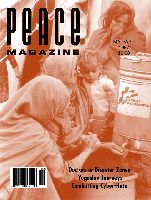
Peace Magazine Mar-Apr 1997, page 24. Some rights reserved.
Search for other articles by Angus Archer here
When Kofi Annan of Ghana was unanimously confirmed by the members of the UN Security Council on December 13, and by the General Assembly on December 17, a U.N. tradition was broken. Never before has a Secretary-General been drawn from the bureaucracy itself. Annan's predecessors were either diplomats or politicians in their own governments.
In these days of intense focus (albeit mainly from the United States) on the efficiency of the U.N. and the need for comprehensive U.N. reform, perhaps a good bureaucrat, steeped in the U.N. machinery, including its administrative, budgetary and personnel aspects, as well as its most visible programs (peacekeeping), is exactly what the U.N. needs as it begins its second 50 years.
His election was by no means simple. His predecessor, Boutros Boutros-Ghali of Egypt, stayed in the running until the very last minute, despite the determination of the U.S. to veto his nomination. It was agreed that an African should have the second five years that were denied to Boutros-Ghali, although the practice has been to rotate the Secretary-Generalship through the major regions. Africans proposed four names, and France threatened to veto Kofi Annan, not because of his French, which was "quite satisfactory," but because they refused to relinquish their support for Boutros-Ghali. Eventually, the French were persuaded by the otherwise unanimous support for Annan.
Kofi Annan was born 58 years ago in Ghana (in his tribe, all male children born on Friday are called Kofi). He studied at the University of Science and Technology at Kumasi and completed his undergraduate work in economics at Macalester College in St. Paul, Minnesota. He undertook graduate studies in economics at the Institut universitaire des hautes études internationales in Geneva, and from 1971-72 was a Sloan Fellow at the Massachusetts Institute of Technology, where he received a Master of Science degree in Management.
Over a period of thirty years, he moved up through the ranks at the U.N. with a reputation for intelligence, fairness, and effectiveness in difficult positions such as personnel, finance and budgetary matters, and peacekeeping operations. His quiet, urbane and courteous exterior has made him popular among U.N. staff and diplomats alike.
On his election, he announced that his three immediate priorities would be: to go to Washington in an attempt to accelerate the payment of U.S. arrears; to "open up" the U.N., both within the Secretariat and by the empowerment of outside groups such as non-governmental organizations to play a greater role in U.N. governance; and to implement U.N. reform quickly and effectively.
One of his first moves was to appoint Maurice Strong of Canada as Executive Coordinator of U.N. Reform. Strong has become almost a deputy Secretary-General, with broad powers to implement fundamental reform throughout the U.N. system.
Angus Archer is Director of Development at the U.N. Association in Canada. He was a neighbor of Kofi Annan on Roosevelt Island and has worked with him on several NGO events in North America and Europe.

Peace Magazine Mar-Apr 1997, page 24. Some rights reserved.
Search for other articles by Angus Archer here